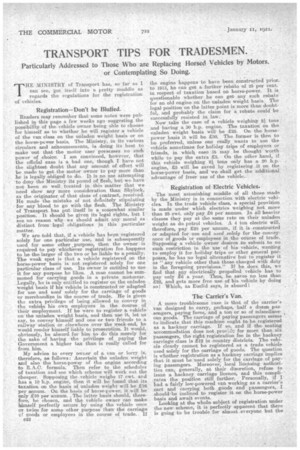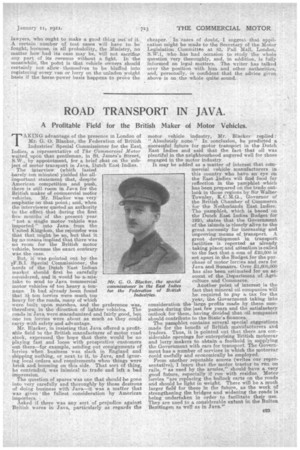TRANSPORT TIPS FOR TRADESMEN.
Page 20

Page 21

If you've noticed an error in this article please click here to report it so we can fix it.
Particularly Addressed to Those Who are Replacing Horsed Vehicles by Motors, or Contemplating So Doing.
THE MINISTRY of Transport has, so far as I can see, got itself into a pretty muddle as regards the regulations for the registration of vehicles
Registration—Don't be Bluffed.
Readers may remember that some notes were published in this page a few weeks ago suggesting the possibility. of the vehicle owner being able to choose for himself as to whether he will register a vehicle of the van class on the unladen weight basis or on the horse,pewer basis. The Ministry, in its various circulars and announcements, is doing its best to make 'out that the motor user possesses no such power of choice. I am convinced, however, that the official case is a bad one, though I have not the slightest doubt that any amount of effort will be made to get the motor owner to pay More than he is legally obliged to do. It is no use attempting to deny the Ministry its pound of flesh, but we have not been so well treated in this matter that we need show any more consideration than Shylock, as the originator of that class of contract, received. He made the mistake of not detnitelly stipulating for any blood to go with the flesh. The Ministry of Transport has put itself in a soniewhat similar position. It should be given its legal rights, but I see no reason whywe should admit any moral as distinct from legal obligations in this particular .matter. We are told that, if a vehicle has been registered solely for one particular use, and is subsequently used for some other .purpose, then the owner is required to pay whichever registration fee happens to be the larger of the two or be liable to a penalty. The weak spot is that a vehicle registered on the horse-power basis is not registered Solely for one particular class of use. Its owner is entitled to use it for any .purpose he likes. A man cannot be summoned for carrying goods in a private motorcar. Legally, he is only entitled to register on the unladen 'weight basis if his vehicle is constructed or adapted for use and used solely for the carriage of goods or merehandize in the course of trade. He is given the extra privilege of being ,allowed to convey in the vehicle his own employees in the course of their employment. If he were to register a vehicle on the unladen weight basis, and :then use it, let us say, to convey himself and one or two friends to a railway station or elsewhere over the week-end, he would render himself liable to prosecution. It would, obviously, be absurd for him to do this merely for the sake of having the privilege of paying the Government a higher tax than is really called for from him.
My advice to every owner of a. van or lorry is, therefore, as follows: Ascertain the unladen weight and also the horse.-power of the engine according to R.A.C. formula: Then refer to the schedules of taxation and see which scheme will work out the Cheaper. Supposing the vehicle weighs 17 cwt. and has a 10 h.p. engine, then it will be found that its taxation on the basis of unladen weight will be £16 per annum. On the basis of horsepower, it will be Only 210 per annum.. The latter basis should, therefore, be chosen, and the vehicle owner can make himself perfectly secure by using the vehicle once or twice for some other purPose. thanthe carriage of goods or employees in the course of trade. If c22 the engine 'happens to have been constructed priors to 1913, he can get a further rebate of 25 per cent. in respect of taxation based on horse-power. It is questionable whether he can get any such rebate for an old engine on the unladen weight basis. The legal position on the latter point is more than doubtful, and Probably the claim for a rebate could be successfully resisted in law. Now take the case of a vehicle weighing 2 tons and having a. 30 h.p. engine. The taxation on the unladen weight basis will be 225. On the horse-. power basis it will be 230. The former is then to be preferred, unless one really wants to use the vehicle sometimes for holiday trips of employees or friends, in which case it may be thought worth while to pay the extra 25. On the other hand, if this vehicle weighing 2 tons only has a 20 h.p. engine, 25 will be saved by registering it on the horse-power basis, and we shall get the additional 'advantage of freer use of the vehicle.
•
--Registration of Electric Vehicles., The most astonishing muddle of all those roads by the Ministry is in connection with electric vehicles. In the trade vehicle class, a special provision is made under which electrics weighing not more than 25 cwt. only pay 26 per annum. In all heavier classes they pay at the same rate on their unladen weight as da petrol vehicles. A 4 ton electric will, therefore, pay 228 per annum, if it is constructed or adapted for use and used solely for the conveyance of goods oremployees in the course of trade. Supposing a, vehicle owner desires to submit to no such restriction in the use of his vehicle, wanting to employ it for holiday trips or other general pur. poses, he has no legal alternative but to register it as "any vehicle other than those charged with duty in the foregoing provisions." If he does this, we find that any electrically propelled vehicle has to pay only £6 a year. Thus, he saves no less than 222, and gets more free use of his vehicle by doing sal Which, as Euclid says, is absurd I
The Carrier's Van.
A more troublesome case is that of the carrier's van designed to carry, perhaps, half a dozen passetngers paying fares, and a ton or so of miscellaneous goods. The carriage of paying passengers seems to indicate, that this machine ought to be registered as a haekney carriage. If so. and if the seating accommodation does not provii 4e. for more than six • passengers, the right registration fee in the hackney carriage class is 212 in country districts. The vehicle clearly cannot be registered as a trade vehicle used solely for the carriage of goods. The question is whether registration as a hackney carriage implies that it must be used solely for the carriage of paying passengers. Moreover, local licensing authorities can' generally, at their discretion, refuse to issue a hackney carriage licence, and this complicates the position still further. Personally, if I had a fairly low-powered van working as a carrier's cart and carrying both goods and passengers, I should-be inclined to register it on the horse-power basis and await events.
Looking at the whole subject of registrationunder the new scheme, it is perfectly apparent that there is going to be trouble for almost.everyone but the lawyers, who ought to make a good thing out of it. A certain number of test cases will have to. be fought, because, in all probability, the Ministry, no matter how bad its case may be, will not sacrifiee any part of its revenue without a fight. In the meanwhile, the point is that vehicle owners should certainly not allowthemselves to be bluffed into registering every van or lorry on the unladen weight basis if the horse-power basis happens to prove the
cheaper. . In 'cases of doubt, I suggest, that application might be made to the Secretary of the Motor. Legislation Committee at 83, Pall Mall, London, S.W11, who has had occasion to study the whole question very thoroughly, and, in addition, is fully informed on legal matters. The writer has talked over the position with him and other authorities, and, personally, is confident that the advice given above is on the whole quite sound.
































